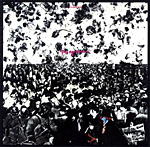Potpourri (P-Model album)
This article needs additional citations for verification. (November 2015) |
| Potpourri | ||||
|---|---|---|---|---|
 | ||||
| Studio album by | ||||
| Released | March 25, 1981 | |||
| Recorded | December 1980 – February 1981 | |||
| Studio | Sunrise Studio (recording and mixing), Ikebukuro, Toshima Warner-Pioneer Studio, Roppongi, Minato Tokyo | |||
| Genre | ||||
| Length | 35:57 | |||
| Label | Warner-Pioneer | |||
| Producer | P-Model | |||
| P-Model chronology | ||||
| ||||
| Singles from Potpourri | ||||
| ||||
Potpourri is the third album of Japanese band P-Model.
Overview
[edit]On the year of Landsale's release, the synthpop boom was reaching critical mass. Bandleader Susumu Hirasawa, feeling the group was in a state of crisis, distanced P-Model from the genre, trying to drive trend followers through rebellious episodes, and replacing their colorful clothing and equipment for a muted getup (black, white, gray and blue). At one concert, a leaflet titled "The Point of Coming to a Concert" was distributed while Landsale was looped endlessly through the PA system; the band did not play until the concertgoers started an uproar which led to a backlash against the band.[1]
Bassist Katsuhiko Akiyama's creative position was in an opposite direction to where Hirasawa wanted to take P-Model, so he was fired from the band, and his songs were not played anymore. He was replaced by high school sophomore Tatsuya Kikuchi, a student of Hirasawa's at the Yamaha Synthesizer School. Kikuchi did not formally join the band while Potpourri was being recorded, leading Hirasawa and keyboardist Yasumi Tanaka to play bass parts on the album, each doing the songs they wrote.[2]
Potpourri has a harsher and more off-putting sound than previous albums, with P-Model employing different instruments and experimental recording techniques. Guitar is more prominent than the keyboard-centric albums from before, leaving synthesizers to go almost unused. Hirasawa incorporates greater antagonism into his vocals, sometimes to the point of screaming them.
The album alienated P-Model's fanbase, leaving only a core audience that would persist with Hirasawa throughout his career.
Track listing
[edit]All tracks are written by Susumu Hirasawa, except where noted
| No. | Title | Lyrics | Music | Length |
|---|---|---|---|---|
| 1. | "junglebed I" (ジャングルベッドI jangurubeddo I) | instrumental | 2:00 | |
| 2. | "blue cross" (青十字 ao jūji) | 2:36 | ||
| 3. | "junglebed II" (ジャングルベッドII jangurubeddo II) | 3:49 | ||
| 4. | "blue print" (ブループリント burūpurinto) | Yasumi Tanaka | Tanaka | 2:17 |
| 5. | "aqualife" | Hirasawa, Tanaka | Tanaka | 2:51 |
| 6. | "different≠another" | 2:21 | ||
| 7. | "anothersmell" | instrumental | Tanaka | 1:47 |
| 8. | "film" (フィルム firumu) | 2:52 | ||
| 9. | "monochrome screen" (モノクローム・スクリーン monokurōmu sukurīn) | Tanaka | Tanaka | 2:52 |
| 10. | "marvel" | 2:56 | ||
| 11. | "natural" (ナチュラル nachuraru) | Tanaka | Tanaka | 2:55 |
| 12. | "disgusting telephone" (いまわし電話 imawashi denwa) | 3:13 | ||
| 13. | "potpourri" (ポプリ popuri) | 3:19 |
"film" contains an interpolation of Yoshiko Ishii's 1959 translation (originally performed and recorded by Ishii alongside the Dark Ducks) of the traditional French children's song "J'ai Perdu le Do de Ma Clarinette" (クラリネットをこわしちゃった, Kurarinetto wo Kowashi Chatta, French: 'I Lost My Clarinet's C', Japanese: 'I Broke My Clarinet'), believed to date no earlier than 1800.
In all releases of the album, the titles with Japanese characters listed are rendered only in them, except for the title track which is rendered as "potpourri (ポプリ)".
Personnel
[edit]- P-Model – production, arrangements
- Susumu Hirasawa – vocals, guitar, bass (1–3, 6, 8, 10, 12–13)
- Yasumi Tanaka – Combo organ, synthesizer, bass (4–5, 9, 11), echo machine,[3] backing vocals
- Sadatoshi Tainaka – drums, cowbell, percussion, backing vocals
- Visual staff
- Yūichi Hirasawa (credited as "you. hirasawa") – art director
- Hōseki Hirasawa – calligraphy
- Api Yomiya – photography
- Hiroshi Akasaka – art coordinator
- Staff
- Makoto Furukawa – engineering, mixing
- Yukio Seto – A&R
- Kazuhiro Suzuki – production coordinator
- Model House – productive management
- special thanks to: Tatsuya Kikuchi, Masami Orimo
Release history
[edit]| Date | Label(s) | Format | Catalog | Notes |
|---|---|---|---|---|
| March 25, 1981 | Warner-Pioneer | LP | K-12005W | |
| CS | LKF-7025 | |||
| January 25, 1992 | Warner Music Japan | CD | WPCL-605 | Released (alongside In a Model Room and Landsale) a month before the release of P-Model. |
| May 10, 2002 July 4, 2014 |
Chaos Union, Teslakite | CHTE-0006 | Remastered by Hirasawa. Part of Disc 2 of the Ashu-on [Sound Subspecies] in the solar system box set, alongside parts of the "Dual Perspective" & "Exercises for the Heavenizer" series of songs from 1981 & 1982. Re-released with new packaging by Kiyoshi Inagaki. | |
| December 20, 2003 | Warner Music Japan, sky station, SS RECORDINGS | SS-103 | Packaged in a paper sleeve to replicate the original LP packaging. Includes new liner notes by music industry writer Dai Onojima. |
- The album's single was reissued on CD on a paper sleeve to replicate its original packaging with the band's other Warner-Pioneer released singles as part of the Tower Records exclusive Warner Years Singles Box box set in 2012.
See also
[edit]References
[edit]- ^ "P-MODEL / 平沢進 バイオグラフィ". MODEROOM. Fascination, inc.
- ^ Takahasi, Kasiko (2010) [1999]. 改訂DIGITAL復刻版 音楽産業廃棄物 [Music Industrial Wastes Rev.2.4]. Vol. P-Model Side — Open Source (3rd ed.). Fascination. p. 35.
- ^ P-Model Box Catalog, 10 January 1987, p. 2.
